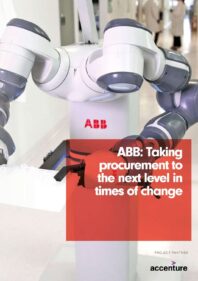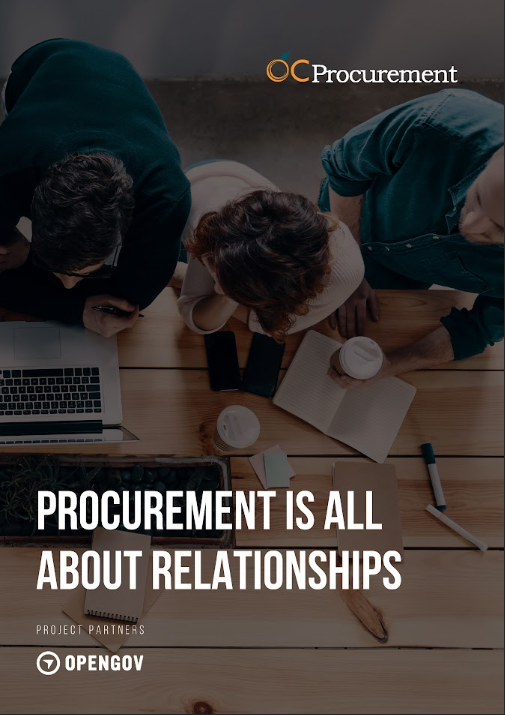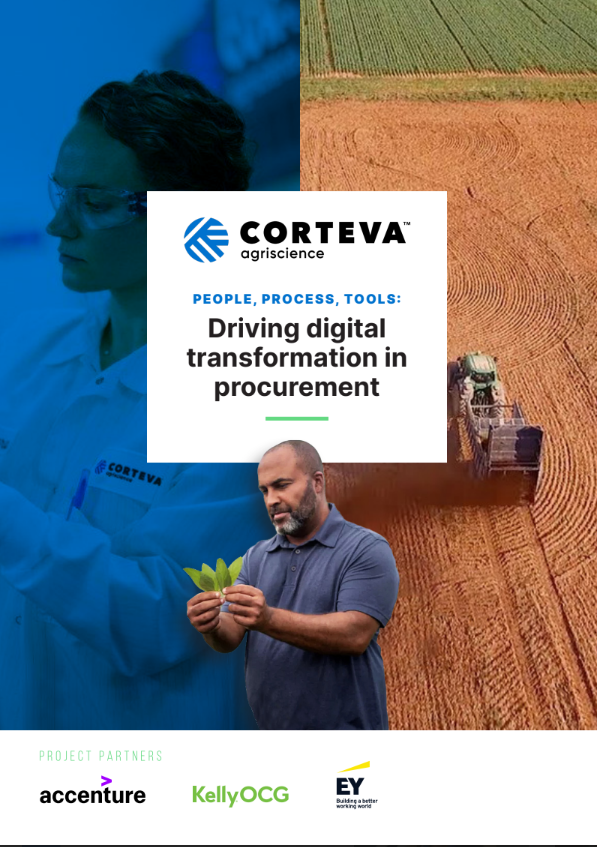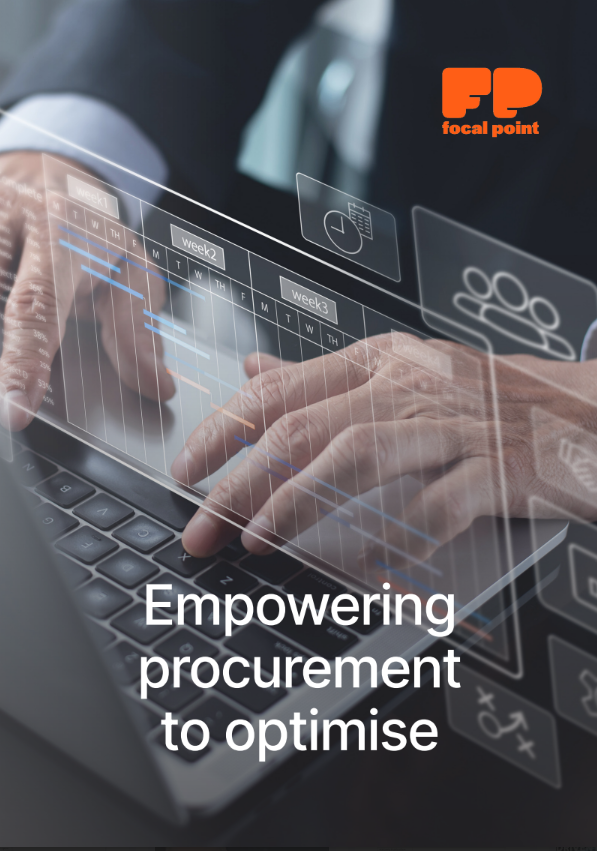The concept of procurement transformation seems almost old fashioned in the sense that it’s something that all major businesses and organisations are currently going through. These transformations are often incredibly complex and full of any number of moving parts and so the challenge is breaking that complexity down into sizable and manageable actions that will allow the company to deliver major change. Technology and the concept of digitalization is a common driver of change within a procurement transformation journey. To put it simply, gone are the days of experience-based decision making. In its place? Data to create actionable insights.
As a technology leader that drives the digital transformation of industries all over the world, ABB is certainly no stranger to the concept. With a history of innovation spanning more than 130 years, ABB has four customer focused, globally leading businesses: Electrification, Industrial Automation, Motion, and Robotics & Discrete Automation, supported by the ABB AbilityTM digital platform.
ABB is the go-to partner for digital transformation, but what happens when the digital transformation comes to indirect procurement at ABB? This is the challenge facing Daniel Stumm, Global Head of Indirect Procurement at ABB and Martin Tomczak, Head of Strategy, Process Excellence & Digital within Global Business Services (GBS) Procurement & Logistics function at ABB.
Procurement & Logistics being one of the services delivered by GBS, which is ABB’s shared services organization, delivering operational and expert services in Finance, Human Resources, Information Systems, Procurement & Logistics, Legal, Global Travel Services and Real Estate. With more than 7,000 people based in five main hubs and front offices, GBS provides business services to ABB teams across the globe.

“The value of indirect procurement at ABB is based on the fact that we are an internal service provider that aims to create a positive bottom line impact for each single business line, while also keeping our ROI as an organization above benchmark,” says Stumm.
“With the decentralization of ABB launched in December 2018 we transformed from a headquarter-focused support model, to a service model that benefits our businesses. Today we work much more closely with the internal clients in those business lines, plus their individual procurement and finance teams, to deliver greater value to our evolving business in line with their business priorities, and drive tangible impact to the profitability.”
As procurement began to engage with the wider ABB businesses it became apparent that procurement spoke its own language; one that wasn’t immediately understood by the business. “We needed to step back and put the emphasis more strongly on the business needs,” says Stumm. “We did this so that we could try and realise their expectations in a way that would make them happy customers and add procurement as a true financial impact – creating an increased purpose as indirect procurement.”

Tomczak, as Head of Strategy, Process Excellence and Digital, knows all too well about the role of data analytics in enabling this true impact. “The time of decisions based on mere experience is over. We must listen to what our company’s internal data tells us and we do that through data lakes,” he explains. “Very early on as part of this journey, ABB was quick to create better transparency by breaking down data silos. Only then can we begin to connect the dots and make the right decisions based on the right data in a quick and effective way.”
The ‘right’ data
Having the right data and making the right decisions quickly is fundamental in order to adapt and survive in an ever-shifting market. It’s written within the DNA of ABB that the company understands and acknowledges customer satisfaction and in order to do so, ABB requires data. Stumm highlights that customer satisfaction is a key KPI for indirect procurement. Indirect procurement measures the satisfaction of its broad internal customer range using Net Promoter Scores (NPS) on an annual basis with a defined group of internal clients. Running in parallel to this, they also measure service quality on a transactional level with customers that use its services. Whenever a customer completes a purchase request through the procurement system or ServiceNow ticketing system, they can rate it between one and five. Stumm highlights that this is similar to how travel and restaurant customers use TripAdvisor to rate their service, and how organisations use that information to listen to the customers and improve.
As procurement works closely with each ABB business, Stumm believes that each business has a ‘different flavour’.
“While we are all part of ABB, there are different objectives across our four businesses– even in terms of expected service quality from us,” he says. “The customer is our business and so we’ve implemented an internal ecosystem that enables constant dialogue with the business and therefore the customer. It’s about making them a part of the decision-making process so that we are together from the very beginning of a project. If we feel friction on something at the early stage, then we can address it together and overcome it. The only way we are going to succeed is by doing it, and failing in some regards, together.”
The power of analytics
Analytics then, is crucial to this ecosystem and constant dialogue within ABB. This in turn redefines the very profile of procurement. ABB built a team of dedicated data analysts, called a ‘Performance Management Team.’ This team, situated in ABB’s Krakow and Bangalore GBS hubs, is focused on the fast development of business intelligence dashboards and detailed spend analytic tools to enable quick decision making. First and foremost however, this team is not made up of purely procurement people; it is a combination of people in IT and analysts that have a good understanding of ABB’s business intelligence.
This is particularly important and beneficial for ABB throughout the COVID-19 pandemic. “Indirect procurement needs to react fast in terms of cutting discretionary spend, an example of which being marketing events that have been canceled,” explains Stumm. “In order to resolve this, the team needs to be able to quickly access and check the cancellation fees of the contract and explore the options available.”
In order to achieve this, a tracking system was needed. “Thanks to our Performance Management Team and their IT expertise, we now have digital dashboards implemented and operating within our Bangalore and Krakow offices,” explains Stumm. “They really stepped up big time. It’s not just us (the management team) who need the access, but our controllers, finance people and people from the business. We now all have an overview on the overall exposure to ABB so we can see, in real time, just how we are working to reduce the exposure to ABB. I think that’s a completely new field of play for the indirect procurement teams, thanks to digitalization.”
Data storage and analytics continue to be of great significance to ABB moving forward. This has completely revolutionised a number of ways in which ABB indirect procurement monitors its operations. For example, with regards to travel, ABB now uses one global travel agency, connected via one global platform. Through this dashboard, controllers and decision makers within ABB can see where people travel, understand the negative and positive outliers in that travel and they can even see whether a booking was made on time – all in line with GDPR. “We really have a new level of transparency with this approach,” explains Stumm. “That wouldn’t have been possible if procurement hadn’t stepped up, consolidated down to one travel agency, and made that enhanced life.”
Another area of significant change is temporary labor. ABB is working to implement an analytics system that will provide complete visibility on its total external workforce. This has redefined the approach entirely, particularly in ABB’s Switzerland operations. “We’re no longer just negotiating markups for temporary agencies, where we take a little bit at total cost. We have the ability, thanks to all the data, to analyse the temporary labor workforce individually.”
“We can then look at things like; are they working longer than the usual 18 months within the company? Rather than wonder whether they can be in-sourced as an alternative, we can now ask the question as to whether these roles could be filled with apprentices too.”
Stumm believes these conversations, thanks to analytics, represent the huge power of procurement and indirect procurement. Indirect procurement can look even further at how it influences not just spend decisions and investment decisions, but also other areas, like sustainability, travel and labor.
Benchmarking
All of this talk of data and customer satisfaction speaks to the broader concept of benchmarking. Capturing and analysing the data is one thing, but you need to be able to benchmark against the market and against others doing the same. “In soccer terms, my ambition is to play in the Champions League,” muses Stumm. “We have to accept first of all that we are not there yet. We may be close to the Champions League in some areas and in it in others, but we still have to improve.”
“It’s about putting the facts on the table and going back to the business, involving them in our development while also working with the outside world and benchmarking ourselves. So not locking ourselves in our small castle, that’s key to improving.”
To that end, ABB called upon the services of Accenture to develop a strategic roadmap. This began with an exercise in assessment and an in-depth analysis of how ABB’s indirect procurement operates by speaking with its customers, its internal teams and with leadership.
Markus Schebitz Managing Director at Accenture Strategy, along with Karin Larsson, Senior Manager and Markus Hoppe, Principal Director of Accenture Strategy, has worked closely with Daniel and Martin as part of this assessment and will continue to do so throughout the transformation journey. The remit was simple, define the plan for the future within this decentralised model. “Procurement in leading companies is beginning to look starkly different from what it used to. This requires that you look beyond simply; this is where we are today and where we could be tomorrow,” he says. “It requires you to think about how you can reinvent yourself and work out what is the art of the possible, fueled by pockets of excellence that we see in the market?”
Accenture took the ABB leadership team on a ‘Procurement Digital Safari’ to deep dive into the platform and niche solutions in the market and how those solutions could benefit ABB in its journey. 30 key focus areas were identified and together the two companies explored and identified gaps and current capabilities and how to improve them. Through this, a roadmap was born. One that was accessible and developed with a top-down approach.
“You need to ensure that you bring leadership on the journey and the solutions actually help them solve the problems that they have on the ground,” says Schebitz. “You need to realise you can’t become the leader in everything. It’s just impossible. You need everyone from the top down involved.”
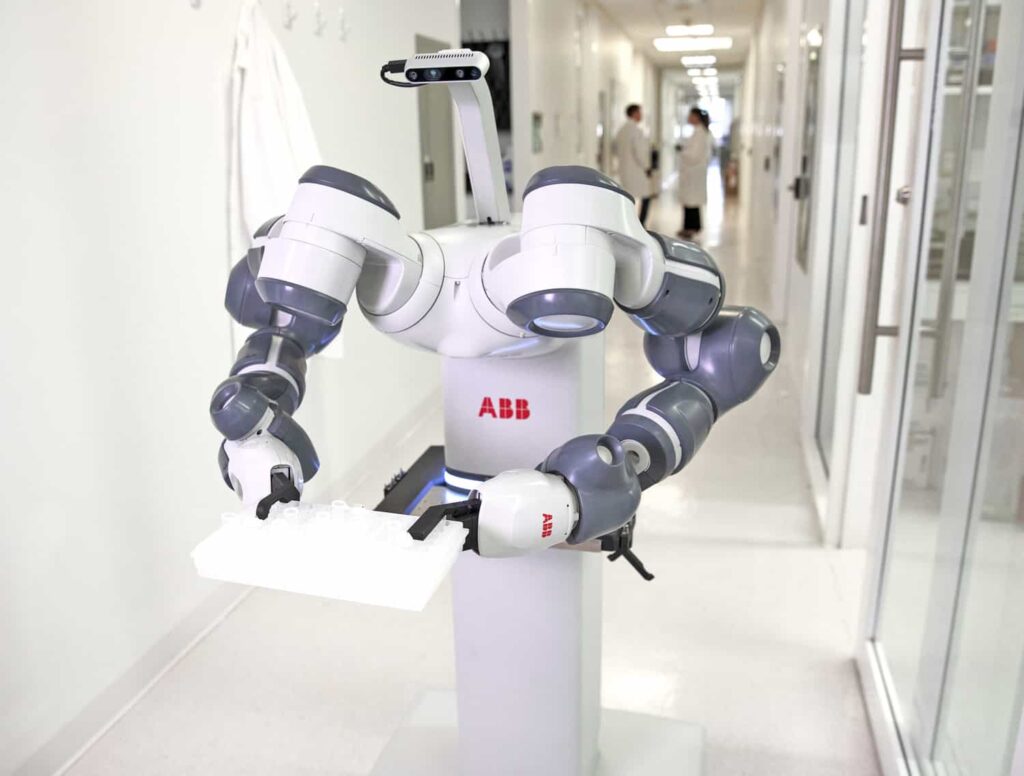
Schebitz compliments the way in which ABB have collaborated with Accenture in allowing them to understand what ABB wants to be. Schebitz feels this was important in finding the right priorities for this journey. “We spent a lot of time with the leadership team to enable them all to be able to articulate this,” he says. “That for me has been the key input to ensuring that the roadmap that they’re putting in place, is actually in line with where they need to improve.”
A focused approach to technology
Digital transformation can become awash with buzzwords and inundated with technologies that may or may not provide value. Schebitz admits that it can be easy to fall victim to this and invest because of market trends. The approach to digital transformation is something that Tomczak in particular is keen to rethink. “We have to move away from the traditional thinking of digital transformation where we feel it’s all about this one big project that solves our problems but in reality, will never get implemented,” he explains. “We also have to go away from searching for the right problem for a particular solution. A proper demand collection process is key to driving digital transformation. It allows us to focus on the best possible solution approach for each identified opportunity and its underlying business case.”
In building a demand collection process, ABB will avoid focusing on solutions such as Robotics Process Automation (RPA), chatbots or machine learning in the first instance but rather on the opportunity to transform the perceived value by doing so. Tomczak reflects on the role in which Accenture has played in this.
“Working with Accenture, we’ve been able to identify smaller initiatives complementary to the ones we had on our agenda already ensuring alignment with the bigger transformation picture,” he says. “Managing this complexity can be very difficult especially for decentralized companies with a strong global presence.”
Through this roadmap, ABB can look closer at the procurement tools at its disposal and how best to streamline processes. This includes the use of Amazon Business Services as a marketplace for tail end spend, something which Stumm highlights was inspired from the B2C experience. “We also still push e-auctions which is nothing new, but it’s something that’s still not used sufficiently in the area of indirect procurement from our point of view,” he says. “Using e-auctions is an important basic step to truly digitalize sourcing, laying the groundwork for sourcing automation.”
ABB also collaborates with big as well as smaller tech companies to utilize the latest technologies. The outcome of such collaborations are projects and studies around the usage of Robotic Process Automation (RPA), chatbots and text mining as well as an agnostic user interface to drive usability and offer internal employees one go-to service point for their requests. Usually the biggest value derives out of projects that take the strengths of different technologies and combine them into one solution design.
Empowering people
Around 60% of ABB’s Indirect Procurement Team are located in Global Business Services main hubs situated in five countries, including India, Poland, Estonia, Mexico and China. Stumm is keen to highlight the importance of bringing procurement practitioners along this journey. “The average age of our team members is quite young. So technology is really close to their heart as they’ve grown up in a digital world,” he says. “In order for us to leverage the capabilities of the new technology and the digitalization of our department, it’s also a question of mindset and having those people that are in tune with the technology driving it. There are those who aren’t as tech savvy, but we see that the rest find it easy to follow because with the footprint that we have, it comes naturally.”
Stumm notes that, where necessary, ABB will invest in upscaling its staff because they will be closer to the customer – the key stakeholder. These customers need to be brought along the journey. As Stumm highlights, customers in the digital age may favour self-service but that does not mean removing face to face human interaction. “ABB has done a tremendous job in the past with digital workspaces and new ways of working to enable efficiency independent from locations, time zones and age. In addition, it allows us to engage with our stakeholders around the world” says Tomczak.
With a roadmap in place and eyes set firmly on making the right decisions now in order to enable a better tomorrow, Stumm is committed to his belief that ABB’s Indirect Procurement needs to be playing in the Champions League. He also recognises that, even when the company gets there, the job isn’t done and the journey doesn’t really end.
“We’ve benchmarked and outlined where we want to go with the help of Accenture. But that’s just part of the journey,” he says. “We still have a lot we need to do. What’s important is that we never stop and that we never stop listening to our internal clients. We must continue to benchmark ourselves against the market and therefore provide true value to ABB.”
“It goes back to what I said earlier, we need to involve as many people as we can and not lock ourselves in our small castle within procurement. Only then can we continue to provide better service quality.”
